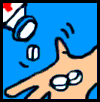|
|
The most common sleeping medications that are used these days are
the Benzodiazepines, with names including (in alphabetical order):
Ativan, Dalmane, Doral, Ducene, Euhypnos, Halcion, Lexotan,
Librium, Mogadon, Murelax, Noctamide, Normison, Oxpam, Paxane,
ProSom, Restoril, Rohypnol, Serax, Serenid, Serepax, Temazepam,
Tranxene, Valium and Xanax.

Sleeping medications like these can be helpful if you use them
only intermittently (no more than once or twice a week). They
become a problem when you use them every night for months or years.
If you have been taking sleeping medication every night for months
or years and you wish to cease doing so, it is important that you
reduce the dosage of your medication gradually, in consultation
with your doctor, while using the "Sleep Better Without Drugs"
self-help program.
When sleeping medications like the ones named above are used every
night for months or years, there are three main problems:
- First, tolerance can build up. That is, you need more and more
medication to get the same effect, and eventually the medication
may cease to have any beneficial effect at all. I have worked with
one man who was in the habit of taking eight (8) Mogadon each
night - and his sleep was still chaotic!
- Second, as with any medication, sleeping medication can have
unpleasant side-effects. The most common side-effect that people
notice is a 'hangover' type of feeling next morning. Other side-
effects that have been noted with long-term use of benzodiazepines
include nervousness, anxiety, tension, lack of energy,
listlessness, trembling, sweating, aches and pains, difficulty in
concentrating, headaches, upset stomach, diarrhoea, and - disturbed
sleep and insomnia. This is not a misprint! The same sleeping
medication that starts out helping you to sleep better can
eventually have the side-effect of causing you to sleep worse
than you would have slept if you were taking no medication at all.
- Third, and most important of all, when you reduce or eliminate
sleeping medication after taking it every night for months or years, there are
often withdrawal effects. Benzodiazepine sleeping medications
suppress Rapid Eye Movement sleep (REM sleep, or dream sleep). If
you have been taking sleeping medication every night for some
months or years, when you reduce or eliminate the dosage you are
likely to have an upsurge in REM sleep. You may experience this
as an increase in unpleasant dreams, or you may experience a
general tendency for your sleep to be worse for a while (trouble
falling asleep, frequent waking, light sleep, early morning waking,
and so forth). This has been reported widely in the professional
literature, and is known as Drug Withdrawal Insomnia or Rebound
Insomnia.
|


